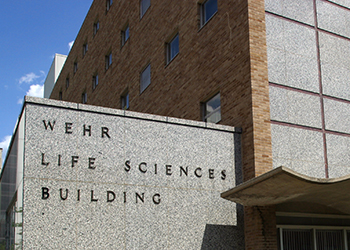Associate Professor
Regulation of development and function under temperature stress in C. elegans
Education
B.S., 2000, Juniata College, Huntingdon, PA
Ph.D., 2006, Yale University, New Haven, CT
Postdoctoral Fellow 2007-2012, University of California- Santa Cruz,
Courses Taught
BIOL 4201 – Genomics and Bioinformatics
BIOL 4202 – Experimental Genetics Lab
INBI 4997 – Bioinformatics Capstone
BIOL 8301 – Cell/Molecular Biology of Early Development
Research Interests
Regulation of development and function under temperature stress in C. elegans
Organisms must respond to their environment
The aim of the research in my lab is to elucidate mechanisms that underlie the ability of organisms to successfully develop and function in the face of environmental challenges. We use the small nematode Caenorhabditis elegans to investigate these mechanisms in the face of changing environmental conditions, specifically changing temperature. Understanding how organisms can respond to moderate temperature increases is important for knowing what will happen to species in the face of global climate change. My lab has two research focuses where we study different ways that C. elegans respond to elevated temperature.
Loosing fertility at high temperature
Sensitivity of the germline, the tissue that makes sperm and egg cells, to elevated temperature is conserved from worms to humans, so much so that many species of farm animals cannot be mated in summer. We are trying to understand what goes wrong in worms that leads to loss of fertility with moderate temperature stresses. We have shown C. elegans worms drastically lose fertility between 26°C and 27°C (~79 and 80°F) (Petrella, 2014). This work showed that the elevated temperature has effects on both sperm and egg cells. We are currently working on two projects to understand the effects of temperature on fertility. First, we have found that male worms have drastically reduced ability to mate at elevated temperature- thus they cannot pass on their genome (Nett et al., 2019). We are working to understand why males cannot mate at high temperature. Is it a sensory neuron problem- they cannot find their mates? Is it a movement problem? Do they also have problems with their sperm? All of these questions are still open. Second, we are investigating how worms can make good eggs at elevated temperature. When eggs are made they need to be filled with lots of proteins and RNA to allow for embryos to develop. One way this happens is that during egg cell development some of the eggs die and donate their stuff to another egg to make the egg that survives better. We are investigating how changes in the amount of cell death during egg development could be necessary to make better eggs when worms are stress by elevated temperatures. These projects combined will allow us to understand how populations of worms lose fertility when their climate changes.
The DREAM complex and LIN-15B are important for cell fate
The DREAM complex is a conserved protein complex that works to turn off gene expression. We have shown that the DREAM complex works with the LIN-15B protein to repress expression of genes in the soma that are normally only expressed in the germline. DREAM complex or lin-15B mutants show expression of these germline genes in somatic tissues (Petrella et al., 2011). Interestingly, germline gene are more strongly expressed when worms are grown at 26°C, which results in a high temperature larval arrest phenotype. Our recent work has that the DREAM complex and LIN-15B are working through changes in chromatin during worm embryogenesis (Costello and Petrella, 2019; Rechtsteiner et al, 2019). We are currently investigating what pathways are necessary to drive the expression of ectopic germline gene expression in the absence of these repressive factors. We have found that the planar cell polarity WNT signaling pathway is one of the strongest drivers of ectopic germline gene expression (Cherian et al., 2020), and are currently determining how and when this signaling plays a role in these phenotypes during development. One of the most exciting aspects of this work is it relationship to cancer biology. Like our worms, human tumors are known to have misexpression of genes that should only be expressed in the germline. Additionally, both Wnt signaling and the DREAM complex are known to be involved in cancer progression. Using our model we are seeking to understand the cellular events that occur when these processes are messed up so that they could be further developed into cancer therapeutics.
Selected Publications
- Cherian, J.R. and Petrella, L.N. (2020) Wnt signaling drives ectopic gene expression and larval arrest in the absence of the Caenorhabditis elegans DREAM repressor complex. 10:863-874.
- Costello, M.E., and Petrella, L.N. (2019) elegans synMuv B proteins regulate spatial and temporal chromatin compaction during development. Development. 146:dev174383
- Nett, E.M., Sepulveda, N.B., and Petrella, L.N. (2019) Defects in mating behavior and tail morphology are the primary cause of sterility in Caenorhabditis elegans males at high temperature. J Exp Bio. 222:jeb208041.
- Petrella, L.N. Natural variants of C. elegans demonstrate defects in both sperm function and oogenesis at elevated temperatures. PLoS One. 9:e112377.
Honors and Awards
REIS Diverse Course Development Grant (with Dr. Tony Gamble)
Way Klingler Young Scholars Award (2015)
Markos Family Breast Cancer Woman Faculty Scholar Grant (2016)
Students
Kristen Quaglia (Ph.D. student)
Dr. Petrella is currently accepting new Ph.D. students into her lab
Former Students:
Nicholas Sepulveda, 2023, Ph.D.
Jerrin Cherian, 2020, Ph.D.
Franki Compere, 2020, M.S.
Meghan Costello, 2019, Ph.D.





